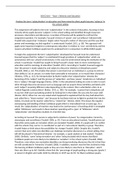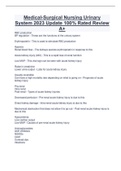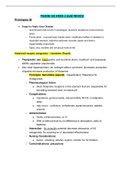SOCG3110 – ‘Race’, Ethnicity and Education
Analyse the term ‘subjectivation’ in education and how minority ethnic pupils become ‘subjects’ in
the school setting
This assignment will address the term ‘subjectivation’ in the context of education, focusing on how
minority ethnic pupils become ‘subjects’ in the school setting and identified through classroom
processes, interactions and discourses. A number of theories will be applied to confront the
assignment question. For example, Foucault’s theory of ‘power’ and ‘surveillance’ followed with
Youdell who argues that ‘resistance’ begins when Foucault’s notion of ‘discourse and the way that
power and knowledge are tied together’ is understood (Youdell, 2011, p. 38). This approach will
apply some important insights to contemporary education in relation to ‘race’ and ethnicity and the
reasons why Black Caribbean pupils tend to underperform in comparison to White British pupils.
To begin the assignment the term ‘subjectivation’ developed by Foucault must be understood.
Foucault argues that the ‘subject’ is constituted through practices of ‘subjectivation’ which are
synonymous with our cultural environment, in this case the environment being the institution of the
school. In particular, Youdell has sought to bring Foucault’s classic texts to more contemporary
education and the sociology of education (Youdell, 2011). According to Youdell, Foucault suggests
that ‘the person is made subject by and subject to discursive relations of disciplinary power’
(Youdell, 2006, p. 42). This implies that power is exercised over an individual or a group to enforce
their ability to ‘act in concert, to render them amenable to instruction, or to mould their characters’
(Hindess, 1996, p. 113). An interpretation by Butler implies that ‘subjectivation’ denotes the
becoming of the ‘subject’ and the process of ‘subjection’, and how ‘power’ transforms an ‘individual’
into a ‘subject’ through language (Davies, 2006). In the educational setting we come to refer to each
other through discursive processes such as language and we acquire these identities and labels with
each ‘subject’ acquiring different value depending on the context, this is what Butler refers to as
‘radical linguistic constructivism’ (Butler, 2011, p. 185). For example, ‘a parent had a telephone call
to say her child was traumatising another by locking him in the toilets (he was only five years old)’
(Demie, 2021). When her son was asked what happened he explained that the boy had kicked him
and called him a ‘‘black monkey’’ and ‘because he had been told not to fight he pushed him into the
toilets, it turned out his teacher called him a ‘‘violent liar’’ (Demie, 2021). This shows the negative
stereotyping and labelling of Black Caribbean pupils which is internalised from an early age. As a
result, the ‘subjectivation’ of teachers may lead to the ‘performance’ of teaching which is entangled
within ‘Whiteness’ and results in these teachers operating with a ‘gaze’ of ‘Whiteness’ which
‘subjectivates’ and disciplines students in a harmful way.
According to Foucault ‘the person is subjected to relations of power’ by categorisation, hierarchy,
stereotypes and surveillance (Youdell, 2006, p. 41). From an educational context, Youdell points out
that while some pupils are included, others are excluded (Youdell, 2006). If a pupils self is in conflict
with the school, they can be ‘re-constituted’ as part of a ‘sub-cultural’ identity or group. Therefore,
Youdell helps us think about the possibilities for change (Youdell, 2006). Despite this, Youdell’s
concern that even when new identities can challenge normative discourses in a school setting, they
will still be placed in ‘hierarchical binaries’, for example, a ‘good student or bad student’ (Youdell,
2006). Similarly, ‘same’ being normative and ‘other’ being excluded which means that Black
Caribbean pupils are more likely to be labelled as ‘outsiders’ in the school system (Youdell, 2006).
Therefore, even where non normative identities can disrupt enduring discourses the risk is that they
are still constituted in ‘hierarchy’ (Youdell, 2006). In addition, teachers may feel less inclined to help
the learning of Black Caribbean pupils as they are more likely to view them as ‘disruptive’, which
then sets them up to fail. Statistics show that the ‘percentage of pupils getting a strong pass (grade 5
or above) in English and maths GCSE by ethnicity in 2019 was 26.5%’ for Black Caribbean pupils,






